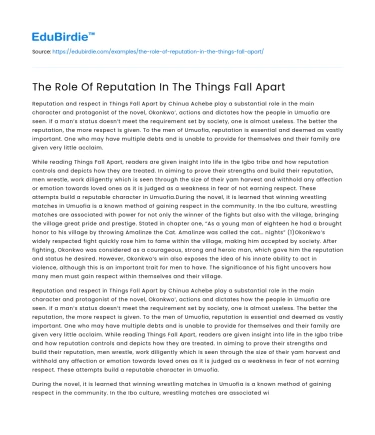Reputation and respect in Things Fall Apart by Chinua Achebe play a substantial role in the main character and protagonist of the novel, Okonkwo’, actions and dictates how the people in Umuofia are seen. If a man’s status doesn’t meet the requirement set by society, one is almost useless. The better the reputation, the more respect is given. To the men of Umuofia, reputation is essential and deemed as vastly important. One who may have multiple debts and is unable to provide for themselves and their family are given very little acclaim.
While reading Things Fall Apart, readers are given insight into life in the Igbo tribe and how reputation controls and depicts how they are treated. In aiming to prove their strengths and build their reputation, men wrestle, work diligently which is seen through the size of their yam harvest and withhold any affection or emotion towards loved ones as it is judged as a weakness in fear of not earning respect. These attempts build a reputable character in Umuofia.During the novel, it is learned that winning wrestling matches in Umuofia is a known method of gaining respect in the community. In the Ibo culture, wrestling matches are associated with power for not only the winner of the fights but also with the village, bringing the village great pride and prestige. Stated in chapter one, “As a young man of eighteen he had a brought honor to his village by throwing Amalinze the Cat. Amalinze was called the cat… nights” (1)Okonkwo’s widely respected fight quickly rose him to fame within the village, making him accepted by society. After fighting, Okonkwo was considered as a courageous, strong and heroic man, which gave him the reputation and status he desired. However, Okonkwo’s win also exposes the idea of his innate ability to act in violence, although this is an important trait for men to have. The significance of his fight uncovers how many men must gain respect within themselves and their village.
Save your time!
We can take care of your essay
- Proper editing and formatting
- Free revision, title page, and bibliography
- Flexible prices and money-back guarantee
Reputation and respect in Things Fall Apart by Chinua Achebe play a substantial role in the main character and protagonist of the novel, Okonkwo’, actions and dictates how the people in Umuofia are seen. If a man’s status doesn’t meet the requirement set by society, one is almost useless. The better the reputation, the more respect is given. To the men of Umuofia, reputation is essential and deemed as vastly important. One who may have multiple debts and is unable to provide for themselves and their family are given very little acclaim. While reading Things Fall Apart, readers are given insight into life in the Igbo tribe and how reputation controls and depicts how they are treated. In aiming to prove their strengths and build their reputation, men wrestle, work diligently which is seen through the size of their yam harvest and withhold any affection or emotion towards loved ones as it is judged as a weakness in fear of not earning respect. These attempts build a reputable character in Umuofia.
During the novel, it is learned that winning wrestling matches in Umuofia is a known method of gaining respect in the community. In the Ibo culture, wrestling matches are associated with power for not only the winner of the fights but also with the village, bringing the village great pride and prestige. Stated in chapter one, “As a young man of eighteen he had a brought honor to his village by throwing Amalinze the Cat. Amalinze was called the cat… nights” (1)
Okonkwo’s widely respected fight quickly rose him to fame within the village, making him accepted by society. After fighting, Okonkwo was considered as a courageous, strong and heroic man, which gave him the reputation and status he desired. However, Okonkwo’s win also exposes the idea of his innate ability to act in violence, although this is an important trait for men to have. The significance of his fight uncovers how many men must gain respect within themselves and their village.
Subsequently, another practice of gaining respect is by growing yams, which is a crop grown exclusively by men. Growing yams is hard labor and the size of a harvest judge work ethic. Yams serve the purpose of feeding a man’s family as it is a staple in the Igbo diet and gaining wealth. The more yams grown, the higher rank you have in society. Yams symbolize masculinity and wealth, which again, equates to respect within the village. In the book, it states, “His mother and sisters worked hard enough, but they grew women’s crops, like cocoyams, beans, and cassava. Yam, the king of crops, was a man’s crop.” (22) Yam is judged as a man’s crop because it is a crucial part of the Igbo diet. Men are able to be seen as the primary contributor for their households. This is significant because men are respected when they have the reputation of being a primary provider.
Lastly, Okonkwo fears being seen as a weak man and resembling his father, an unrespected man, concealing his emotions towards his family and society. Okonkwo expresses “Obierika,… If Ezinma had been a boy I would have been happier. She has the right spirit” (66) This supports the fact that Okonkwo makes up excuses for why he cannot love his children or show affection to them for what they are.






 Stuck on your essay?
Stuck on your essay?

